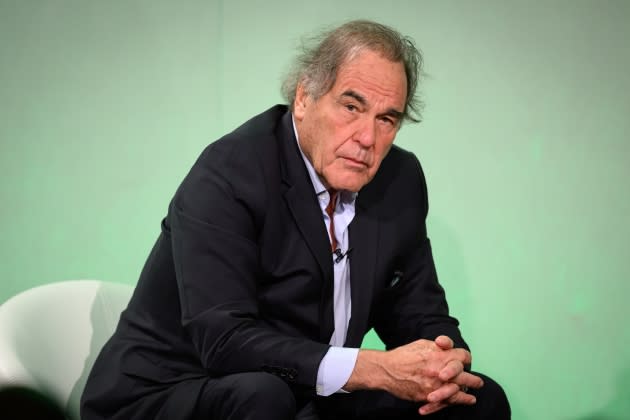Oliver Stone Shocked By ‘Oppenheimer’ SAG-AFTRA Strike Cast Walkout; Says Roots Of Writers Strike Lie In 1988 Deal – Jerusalem Film Festival
- Oops!Something went wrong.Please try again later.
- Oops!Something went wrong.Please try again later.

Oliver Stone said Friday he was shocked to hear that the stars of Christopher Nolan’s Oppenheimer had walked out of its London premiere the day before as SAG-AFTRA officially declared strike action.
“I know several producers are opening movies, like Oppenheimer. Chuck Roven, he was in London. I heard it was going to be cancelled,” said Stone, when asked for his view on the strike.
More from Deadline
SAG-AFTRA Strike Photos: Actors Hit The Picket Lines On Day 1
Fran Drescher Mobbed On SAG-AFTRA Picket Lines, Says Studios Are “Doing Bad Things To Good People”
“I don’t know if it went ahead but all the actors left. That was shocking that they really meant business and cut off right away all the promotion, which is big.”
Commenting on the ongoing 11-week WGA strike, Stone suggested the roots of the current industrial action lie in the deal brokered to end the five-month writers strike in 1988.
“There was a basic miscarriage of justice way back when, when Brian Walton was the head of the WGA, when we gave in. I wasn’t on the front line, but I supported that strike,” said Stone.
“We gave in to the producers. They got away with murder on one of these deals where all that DVD money was deferred. They claimed they were in the hole, in the red, and that they had to get their money back from DVD.
“I forgot what the percentage was, but they took something like the first 75% off the top. The DVD business was huge, especially for my films. So, the gross was never divided fairly.”
Stone said this trend had continued with residuals and profits.
“Not so much residuals, as profits really. Residuals are important for some of the writers who don’t make as much money. But people who do make money, they don’t touch the profits from the film, the studio does,” he said.
“The studio is always telling you that they’re losing money, but they always find a way to make a new level of profit for 10, 15 years. … It’s that perpetual industrial problem with a capitalist group that pays its executives more and more money and screws the average writer.”
Looking back over past industrial action, Stone recalled how the 2007 writers strike initially led to the postponement of his 1968 My Lai massacre drama Pinkville, and then resulted in it being cancelled for good.
“We had three weeks to go and it got cancelled. We got hurt,” he said.
Stone said he doubted there would be a quick or easy resolution to the current writer and actor disputes.
“I don’t think it will be wrapped up quickly. Because well, I don’t understand the economics of Netflix and these new guys, but it’s the same old bullsh*t. You know they’re making money and they always say they’re losing money. It’s the classic conflict that goes back to the 1880s in America.”
Stone was talking to Deadline at the Jerusalem Film Festival, where he showed his 2022 documentary Nuclear Now, arguing the case for nuclear power as the only viable way to tackle climate change.
Based on the book A Bright Future: How Some Countries Have Solved Climate Change and the Rest Can Follow, the work premiered at Venice last year.
The work is a passion project for Stone, who says he was inspired to make the film by his fear of climate change.
“I’m not a science expert and I have no kinship with nuclear power. On the contrary, you could say I was a mild believer in the Jane Fonda-Ralph Nader concept of the 1980s that nuclear power was dangerous,” said the director, who also took co-writing credits with U.S. scientist Joshua Goldstein.
“But it’s clear to me from my travels all over the world, that it’s getting hotter, and hotter, and hotter. We were in Italy, two, three days ago, and they said it was hottest day on record or something.”
Stone was also honored with a lifetime achievement award from the Jerusalem Film Festival at the opening ceremony Thursday evening alongside Helen Mirren and Belgian directorial duo Luc and Jean-Pierre Dardenne.
The director last spent extensive time in the country in 2002 at the height of Second Intifada to make his documentary Persona Non Grata, in which he interviewed Israeli leaders Benjamin Netanyahu, Shimon Peres, Ehud Barak, Ariel Sharon as well as the Palestinian Al Aqsa Brigade on the Middle East conflict.
Two decades on, he suggested the situation is unchanged.
“It’s a repetitive cycle. I’ve been here several times. I planted an olive tree for peace here in the ’90s with my then-partner Arnon Milchan and came back in 2002 for Persona Non Grata. … I don’t see a difference. It’s just worse. Like it’s getting hotter. It’s just getting more and more choked.”
Best of Deadline
Sign up for Deadline's Newsletter. For the latest news, follow us on Facebook, Twitter, and Instagram.

